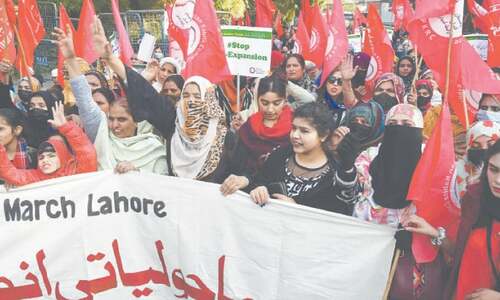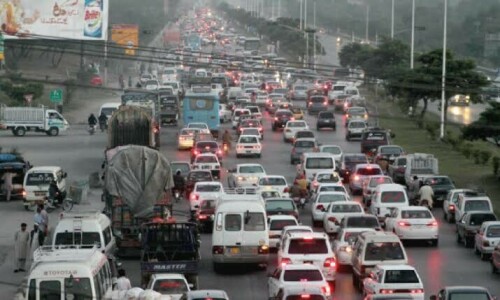HONG KONG: Hundreds of Hong Kong protesters blocked train services during the morning rush hour on Tuesday, causing commuter chaos in the latest anti-government campaign to roil the former British colony.
What started three months ago as rallies against an extradition bill that would have allowed people in Hong Kong to be sent to mainland China for trial, has evolved into a wider backlash against the city’s government and its political masters in Beijing.
Protests have occurred almost daily, sometimes with little notice, disrupting business, piling pressure on the city’s beleaguered government and stretching its police force, which some have accused of using excessive force.
Activists blocked train doors, playing havoc with services and forcing hundreds of people to stream out of railway stations in search of alternative transport.
“We don’t know how long we are going to stay here, we don’t have a leader, as you can see this is a mass movement now,” said Sharon, a 21-year-old masked protester who declined to give her full name.
“It’s not our intention to inconvenience people, but we have to make the authorities understand why we protest. We will continue with this as long as needed.” Others chanted, “Liberate Hong Kong,” and “Revolution of our time”.
By mid-morning, commuters were crammed into stations across the city, waiting to board trains that were badly delayed, with no service on some lines. Rail operator MTR Corp urged people to seek other transport.
Transport Secretary Frank Chan called on protesters to stop targeting a rail network that provides transport to five million people a day, public broadcaster RTHK reported.
Hong Kong, which returned to China in 1997, is embroiled in its worst political crisis for decades after two months of increasingly violent protests that have posed one of the gravest populist challenges to Communist Party rulers in Beijing.
China on Monday reiterated its support for Hong Kong’s embattled leader, Carrie Lam, and its police and urged Hong Kong people to oppose violence. Lam’s popularity has dropped to a record low, according to a survey by the independent Public Opinion Research Institute released on Tuesday.
The survey, conducted between July 17 and July 19, showed Lam scored a rating of 30.1, down from 33.4 at the beginning of the month. Her approval rate stands at 21 percent, while her disapproval rate is 70 percent.
Over the last few years, many people in Hong Kong have become concerned about the whittling away of the city’s freedoms, guaranteed under a “one country, two systems” formula established when it returned to China in 1997.
China denies interfering and has warned that the protests are an undisguised challenge to the formula under which the city is ruled, and risked damaging its economy.
The mass transit protest follows a demonstration at the Chinese-ruled city’s international airport on Friday and violent protests at the weekend when activists clashed with police who fired rubber bullets, tear gas and sponge grenades — a crowd-control weapon.
Some scuffles broke out between commuters and protesters, who gradually began to disperse, while more police were deployed in stations, where they stopped protesters to search their bags.
Commuters grew increasingly frustrated over the disruption, and shops, including bakeries and convenience stores, had also begun to close.
“It’s so inconvenient and annoying, really. I am in hurry to work, to make a living. Will you give away your salary to me?” said a 64-year-old man surnamed Liu. Others were more supportive, refusing to blame the protesters.
“This non-cooperation movement is caused by Carrie Lam. She doesn’t cooperate with the people of Hong Kong or respond to their demands,” Jason Lo, 31, told Reuters as he waited for a train.
Published in Dawn, July 31st, 2019














































